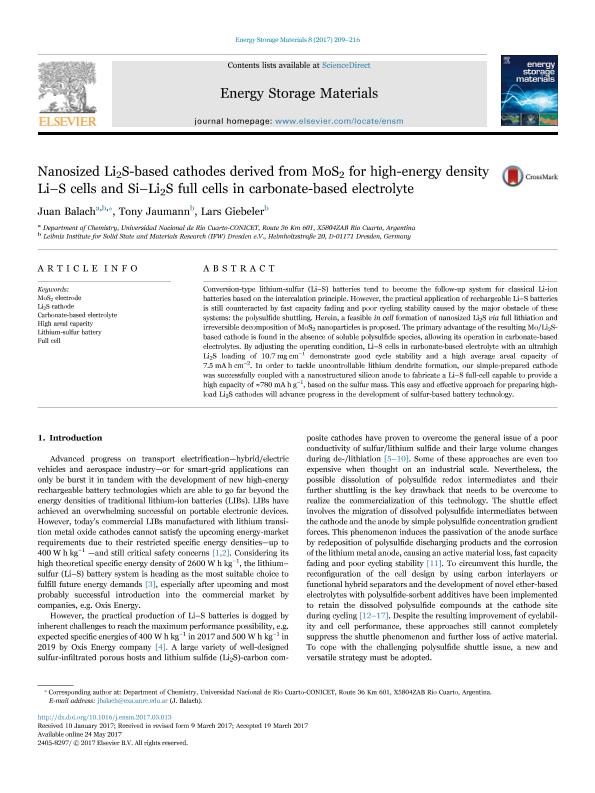Mostrar el registro sencillo del ítem
dc.contributor.author
Balach, Juan Manuel

dc.contributor.author
Jaumann, Tony

dc.contributor.author
Giebeler, Lars

dc.date.available
2022-11-24T12:44:19Z
dc.date.issued
2017-07
dc.identifier.citation
Balach, Juan Manuel; Jaumann, Tony; Giebeler, Lars; Nanosized Li2S-based cathodes derived from MoS2 for high-energy density Li–S cells and Si–Li2S full cells in carbonate-based electrolyte; Elsevier; Energy Storage Materials; 8; 7-2017; 209-216
dc.identifier.issn
2405-8297
dc.identifier.uri
http://hdl.handle.net/11336/178785
dc.description.abstract
Conversion-type lithium-sulfur (Li–S) batteries tend to become the follow-up system for classical Li-ion batteries based on the intercalation principle. However, the practical application of rechargeable Li–S batteries is still counteracted by fast capacity fading and poor cycling stability caused by the major obstacle of these systems: the polysulfide shuttling. Herein, a feasible in cell formation of nanosized Li2S via full lithiation and irreversible decomposition of MoS2 nanoparticles is proposed. The primary advantage of the resulting Mo/Li2S-based cathode is found in the absence of soluble polysulfide species, allowing its operation in carbonate-based electrolytes. By adjusting the operating condition, Li–S cells in carbonate-based electrolyte with an ultrahigh Li2S loading of 10.7 mg cm–1 demonstrate good cycle stability and a high average areal capacity of 7.5 mA h cm–2. In order to tackle uncontrollable lithium dendrite formation, our simple-prepared cathode was successfully coupled with a nanostructured silicon anode to fabricate a Li–S full-cell capable to provide a high capacity of ≈780 mA h g–1, based on the sulfur mass. This easy and effective approach for preparing high-load Li2S cathodes will advance progress in the development of sulfur-based battery technology.
dc.format
application/pdf
dc.language.iso
eng
dc.publisher
Elsevier

dc.rights
info:eu-repo/semantics/openAccess
dc.rights.uri
https://creativecommons.org/licenses/by-nc-sa/2.5/ar/
dc.subject
CARBONATE-BASED ELECTROLYTE
dc.subject
FULL CELL
dc.subject
HIGH AREAL CAPACITY
dc.subject
LI2S CATHODE
dc.subject
LITHIUM-SULFUR BATTERY
dc.subject
MOS2 ELECTRODE
dc.subject.classification
Físico-Química, Ciencia de los Polímeros, Electroquímica

dc.subject.classification
Ciencias Químicas

dc.subject.classification
CIENCIAS NATURALES Y EXACTAS

dc.title
Nanosized Li2S-based cathodes derived from MoS2 for high-energy density Li–S cells and Si–Li2S full cells in carbonate-based electrolyte
dc.type
info:eu-repo/semantics/article
dc.type
info:ar-repo/semantics/artículo
dc.type
info:eu-repo/semantics/publishedVersion
dc.date.updated
2022-11-23T18:01:58Z
dc.journal.volume
8
dc.journal.pagination
209-216
dc.journal.pais
Países Bajos

dc.description.fil
Fil: Balach, Juan Manuel. Universidad Nacional de Rio Cuarto. Facultad de Ciencias Exactas Fisicoquímicas y Naturales. Departamento de Química y Física; Argentina. Consejo Nacional de Investigaciones Científicas y Técnicas. Centro Científico Tecnológico Conicet - Córdoba; Argentina
dc.description.fil
Fil: Jaumann, Tony. Leibniz Institute for Solid State and Materials Research; Alemania
dc.description.fil
Fil: Giebeler, Lars. Leibniz Institute for Solid State and Materials Research; Alemania
dc.journal.title
Energy Storage Materials
dc.relation.alternativeid
info:eu-repo/semantics/altIdentifier/doi/http://dx.doi.org/10.1016/j.ensm.2017.03.013
Archivos asociados
